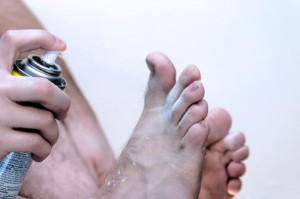 Athlete’s foot is a contagious fungal skin infection. This fungal infection typically thrives in moist, warm environments. Not wearing the proper footwear in locations such as gyms, locker rooms, public swimming pools, and communal showers may increase your risk of getting this fungal infection. There are certain symptoms that are commonly associated with this condition. These may include itchy blisters on the feet, dry skin on the soles or sides of the feet, a stinging or burning sensation between the toes, and cracking or peeling of the skin between the toes. Some patients have found antifungal powder to be helpful in trying to relieve these symptoms. For a proper diagnosis and advised plan of treatment, it’s suggested that you consult with a podiatrist.
Athlete’s foot is a contagious fungal skin infection. This fungal infection typically thrives in moist, warm environments. Not wearing the proper footwear in locations such as gyms, locker rooms, public swimming pools, and communal showers may increase your risk of getting this fungal infection. There are certain symptoms that are commonly associated with this condition. These may include itchy blisters on the feet, dry skin on the soles or sides of the feet, a stinging or burning sensation between the toes, and cracking or peeling of the skin between the toes. Some patients have found antifungal powder to be helpful in trying to relieve these symptoms. For a proper diagnosis and advised plan of treatment, it’s suggested that you consult with a podiatrist.
Athlete’s foot is an inconvenient condition that can be easily reduced with the proper treatment. If you have any concerns about your feet and ankles, contact one of our podiatrists from Lovely Foot Associates, PC. Our doctors will treat your foot and ankle needs.
Athlete’s Foot: The Sole Story
Athlete's foot, also known as tinea pedis, can be an extremely contagious foot infection. It is commonly contracted in public changing areas and bathrooms, dormitory style living quarters, around locker rooms and public swimming pools, or anywhere your feet often come into contact with other people.
Solutions to Combat Athlete’s Foot
Athlete’s foot can cause many irritating symptoms such as dry and flaking skin, itching, and redness. Some more severe symptoms can include bleeding and cracked skin, intense itching and burning, and even pain when walking. In the worst cases, Athlete’s foot can cause blistering as well. Speak to your podiatrist for a better understanding of the different causes of Athlete’s foot, as well as help in determining which treatment options are best for you.
If you have any questions please feel free to contact our office located in Johnstown, PA . We offer the newest diagnostic and treatment technologies for all your foot and ankle needs.
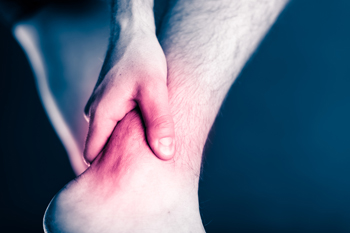 Many runners experience the frustration of dealing with a sports injury that impacts their lower extremities. Whether you’re dealing with plantar fasciitis, a stress fracture, or Achilles tendonitis, it is common for an athlete dealing with a sports injury to want to continue staying in shape and being active. There are a few exercises that can help mimic the activity of running on a more low impact level. One example of this type of exercise is referred to as pool running, or aqua jogging. This activity holds the same concept as if you were on land, except you are under water. While it is low-impact, which is good if you’re dealing with an injury, it is still a high-resistance exercise. Stair walking is another low impact exercise that can help build strength as your body continues to heal. Of course it’s important to listen to your body and monitor any pain felt. For tips on how to stay active while nursing a sports injury, it’s suggested that you speak with a podiatrist.
Many runners experience the frustration of dealing with a sports injury that impacts their lower extremities. Whether you’re dealing with plantar fasciitis, a stress fracture, or Achilles tendonitis, it is common for an athlete dealing with a sports injury to want to continue staying in shape and being active. There are a few exercises that can help mimic the activity of running on a more low impact level. One example of this type of exercise is referred to as pool running, or aqua jogging. This activity holds the same concept as if you were on land, except you are under water. While it is low-impact, which is good if you’re dealing with an injury, it is still a high-resistance exercise. Stair walking is another low impact exercise that can help build strength as your body continues to heal. Of course it’s important to listen to your body and monitor any pain felt. For tips on how to stay active while nursing a sports injury, it’s suggested that you speak with a podiatrist.
Ankle and foot injuries are common among athletes and in many sports. They can be caused by several problems and may be potentially serious. If you are feeling pain or think you were injured in a sporting event or when exercising, consult with one of our podiatrists from Lovely Foot Associates, PC. Our doctors will assess your condition and provide you with quality foot and ankle treatment.
Common Injuries
The most common injuries that occur in sporting activities include:
Symptoms
Symptoms vary depending upon the injury and in some cases, there may be no symptoms at all. However, in most cases, some form of symptom is experienced. Pain, aching, burning, bruising, tenderness, tightness or stiffness, sensation loss, difficulty moving, and swelling are the most common symptoms.
Treatment
Just as symptoms vary depending upon the injury, so do treatment options. A common treatment method is known as the RICE method. This method involves rest, applying ice, compression and elevating the afflicted foot or ankle. If the injury appears to be more serious, surgery might be required, such as arthroscopic or reconstructive surgery. Lastly, rehabilitation or therapy might be needed to gain full functionality in the afflicted area. Any discomfort experienced by an athlete must be evaluated by a licensed, reputable medical professional.
If you have any questions, please feel free to contact our office located in Johnstown, PA . We offer the newest diagnostic and treatment technologies for all your foot care needs.
 Patients who are overweight may have an increased risk of experiencing ankle and foot pain. This may be a result of the excess body weight the feet must bear as everyday activities are completed. The natural pad in the heel area may become thin, and this may lead to heel pain which can be indicative of plantar fasciitis or heel spurs. People who are obese may have difficulty in performing daily exercise routines, which may contribute to the inability to lose weight. Pain may be experienced in the joints, ligaments, and muscles of the feet, and a sedentary lifestyle may be preferred. Research has indicated that foot pain may be controlled by maintaining a healthy weight, and this can be accomplished by eating healthy foods, and starting an exercise regime. If you have questions about how excess weight can affect the feet, please consult with a podiatrist.
Patients who are overweight may have an increased risk of experiencing ankle and foot pain. This may be a result of the excess body weight the feet must bear as everyday activities are completed. The natural pad in the heel area may become thin, and this may lead to heel pain which can be indicative of plantar fasciitis or heel spurs. People who are obese may have difficulty in performing daily exercise routines, which may contribute to the inability to lose weight. Pain may be experienced in the joints, ligaments, and muscles of the feet, and a sedentary lifestyle may be preferred. Research has indicated that foot pain may be controlled by maintaining a healthy weight, and this can be accomplished by eating healthy foods, and starting an exercise regime. If you have questions about how excess weight can affect the feet, please consult with a podiatrist.
The more you weigh, the harder your feet must work to support your body. If you’re an obese individual and are concerned about your feet, contact one of our podiatrists from Lovely Foot Associates, PC. Our doctors can provide the care you need to keep you pain-free and on your feet.
Obesity and Your Feet
People who are overweight are putting more pressure on their ankles, knees, and hips as well as their feet. This unfortunately can lead to variety of different issues.
Problems & Complications Stemming from Obesity
If you have any questions, please feel free to contact our office located in Johnstown, PA . We offer the newest diagnostic and treatment technologies for all your foot care needs.
 Plantar fasciitis is a foot condition that impacts the heel and the arch of the foot. It occurs as a result of an inflamed plantar fascia, which is the portion of tissue that is located on the sole of the foot. It extends the length of the foot, and its function is to connect the toes to the heel. Patients who frequently participate in running and jumping activities may be prone to developing plantar fasciitis. Additionally, it may gradually occur as a result of standing on hard surfaces for extended periods of time throughout the day. Some of the symptoms that are often associated with this ailment can include difficulty in walking, especially after arising in the morning, and the pain and discomfort may hinder the ability to complete daily activities. Mild relief may be felt when the foot is properly stretched. If you have plantar fasciitis, it is strongly suggested that you are under the care of a podiatrist.
Plantar fasciitis is a foot condition that impacts the heel and the arch of the foot. It occurs as a result of an inflamed plantar fascia, which is the portion of tissue that is located on the sole of the foot. It extends the length of the foot, and its function is to connect the toes to the heel. Patients who frequently participate in running and jumping activities may be prone to developing plantar fasciitis. Additionally, it may gradually occur as a result of standing on hard surfaces for extended periods of time throughout the day. Some of the symptoms that are often associated with this ailment can include difficulty in walking, especially after arising in the morning, and the pain and discomfort may hinder the ability to complete daily activities. Mild relief may be felt when the foot is properly stretched. If you have plantar fasciitis, it is strongly suggested that you are under the care of a podiatrist.
Plantar fasciitis can be very painful and inconvenient. If you are experiencing heel pain or symptoms of plantar fasciitis, contact one of our podiatrists from Lovely Foot Associates, PC. Our doctors can provide the care you need to keep you pain-free and on your feet.
What Is Plantar Fasciitis?
Plantar fasciitis is the inflammation of the thick band of tissue that runs along the bottom of your foot, known as the plantar fascia, and causes mild to severe heel pain.
What Causes Plantar Fasciitis?
How Can It Be Treated?
While very treatable, plantar fasciitis is definitely not something that should be ignored. Especially in severe cases, speaking to your doctor right away is highly recommended to avoid complications and severe heel pain. Your podiatrist can work with you to provide the appropriate treatment options tailored to your condition.
If you have any questions please feel free to contact our office located in Johnstown, PA . We offer the newest diagnostic and treatment technologies for all your foot and ankle needs.
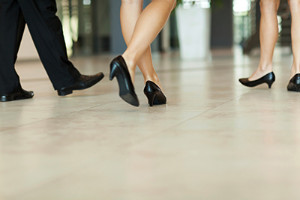 Nursing is an example of a profession that requires standing and working on your feet for the majority of the day. Research has indicated it may be beneficial to rest the feet periodically during the day, which can be done by elevating them while eating or relaxing during a break. It can help to gently stretch the feet as well, which may generally help to improve the blood flow to the feet. Yoga has been known as an effective form of exercise that can be performed on days off, and this may help to increase flexibility and strength in the feet. If you would like additional information about how to protect your feet while working, please consult with a podiatrist.
Nursing is an example of a profession that requires standing and working on your feet for the majority of the day. Research has indicated it may be beneficial to rest the feet periodically during the day, which can be done by elevating them while eating or relaxing during a break. It can help to gently stretch the feet as well, which may generally help to improve the blood flow to the feet. Yoga has been known as an effective form of exercise that can be performed on days off, and this may help to increase flexibility and strength in the feet. If you would like additional information about how to protect your feet while working, please consult with a podiatrist.
While working on the feet, it is important to take the proper care of them. For more information about working on your feet, contact one of our podiatrists from Lovely Foot Associates, PC. Our doctors will treat your foot and ankle needs.
Working on Your Feet
Standing on your feet for long periods of time can cause stress and pain in your feet. Your whole body may experience change in terms of posture, back pain, bunions, callouses and or plantar warts. There are ways to avoid these conditions with proper foot care, smart choices and correct posture.
Positive Changes
Negative heeled shoe – Choosing this shoe type places the heel slightly lower than the ball of the foot. These are great for overall foot health. Find shoes that fit you correctly.
Go barefoot – Our feet were not designed to be enclosed for all hours of the day. Try to periodically expose your feet to air.
Eliminate Pain
Foot Exercises – Performing simple exercises, incorporating yoga and doing stretches are beneficial. This will allow increased blood flow to the area and muscles of the foot.
Achilles tendon – Stretching the foot out flat on the floor will relax the calf muscles and tendon. These exercises can be performed almost anywhere. Make sure you add these exercises to your daily regimen.
With a little bit of this information and knowing more about foot health, you will notice changes. Foot stretches and proper footwear will help with pain and prevent further issues.
If you have any questions please feel free to contact our office located in Johnstown, PA . We offer the newest diagnostic and treatment technologies for all your foot and ankle needs.
 It is a common observation among women who are pregnant to notice specific changes with their bodies, in addition to their growing fetus. Many of these changes involve the feet. Specific foot ailments may cause a general feeling of discomfort for pregnant women. A common foot condition is known as flat feet, which can happen as a result of the added weight the feet must support. As the arch gradually diminishes, the feet may become achy and feel tired for the majority of the day. Mild relief may be felt when shoes that are worn fit correctly. It may also help to wear insoles which may provide an arch. The toenails may be difficult to cut and maintain, and ingrown toenails may develop as a result of this. Additionally, swollen feet is a common side effect of pregnancy, and it is beneficial to elevate the feet as often as possible throughout the day. For additional information about how pregnancy can affect the feet, please consult with a podiatrist.
It is a common observation among women who are pregnant to notice specific changes with their bodies, in addition to their growing fetus. Many of these changes involve the feet. Specific foot ailments may cause a general feeling of discomfort for pregnant women. A common foot condition is known as flat feet, which can happen as a result of the added weight the feet must support. As the arch gradually diminishes, the feet may become achy and feel tired for the majority of the day. Mild relief may be felt when shoes that are worn fit correctly. It may also help to wear insoles which may provide an arch. The toenails may be difficult to cut and maintain, and ingrown toenails may develop as a result of this. Additionally, swollen feet is a common side effect of pregnancy, and it is beneficial to elevate the feet as often as possible throughout the day. For additional information about how pregnancy can affect the feet, please consult with a podiatrist.
Pregnant women with swollen feet can be treated with a variety of different methods that are readily available. For more information about other cures for swollen feet during pregnancy, consult with one of our podiatrists from Lovely Foot Associates, PC. Our doctors will attend to all of your foot and ankle needs.
What Foot Problems Can Arise During Pregnancy?
One problem that can occur is overpronation, which occurs when the arch of the foot flattens and tends to roll inward. This can cause pain and discomfort in your heels while you’re walking or even just standing up, trying to support your baby.
Another problem is edema, or swelling in the extremities. This often affects the feet during pregnancy but tends to occur in the later stages.
How Can I Keep My Feet Healthy During Pregnancy?
If you have any questions please feel free to contact our office located in Johnstown, PA . We offer the newest diagnostic and treatment technologies for all your foot and ankle needs.
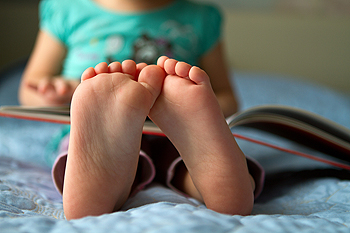 Research has shown it is vital to maintain children’s foot care properly, as this may be helpful in possibly avoiding foot deformities and structural concerns. When children start to walk, the feet may increase in strength as they walk and run barefoot indoors. This may be a result of the grasping action the toes provide as the foot becomes stable on the floor. Many parents purchase their children’s first pair of shoes when walking begins outside. It is beneficial for these shoes to consist of having breathable materials, and laces or velcro that can securely fasten the shoe for maximum stability. Additionally, it is important for the shoes to have adequate room for the toes to move freely in. This can be determined by feeling the top of the shoe. If you would like more information about children’s feet and how to properly buy shoes, it is suggested that you consult with a podiatrist.
Research has shown it is vital to maintain children’s foot care properly, as this may be helpful in possibly avoiding foot deformities and structural concerns. When children start to walk, the feet may increase in strength as they walk and run barefoot indoors. This may be a result of the grasping action the toes provide as the foot becomes stable on the floor. Many parents purchase their children’s first pair of shoes when walking begins outside. It is beneficial for these shoes to consist of having breathable materials, and laces or velcro that can securely fasten the shoe for maximum stability. Additionally, it is important for the shoes to have adequate room for the toes to move freely in. This can be determined by feeling the top of the shoe. If you would like more information about children’s feet and how to properly buy shoes, it is suggested that you consult with a podiatrist.
Making sure that your children maintain good foot health is very important as they grow. If you have any questions, contact one of our podiatrists of Lovely Foot Associates, PC. Our doctors can provide the care you need to keep you pain-free and on your feet.
Keeping Children's Feet Healthy
Having healthy feet during childhood can help prevent medical problems later in life, namely in the back and legs. As children grow, their feet require different types of care. Here are some things to consider...
Although babies do not walk yet, it is still very important to take care of their feet.
Avoid putting tight shoes or socks on his or her feet.
Allow the baby to stretch and kick his or her feet to feel comfortable.
As a toddler, kids are now on the move and begin to develop differently. At this age, toddlers are getting a feel for walking, so don’t be alarmed if your toddler is unsteady or ‘walks funny’.
As your child gets older, it is important to teach them how to take care of their feet.
Show them proper hygiene to prevent infections such as fungus.
Be watchful for any pain or injury.
Have all injuries checked by a doctor as soon as possible.
Comfortable, protective shoes should always be worn, especially at play.
If you have any questions please feel free to contact our office located in Johnstown, PA . We offer the newest diagnostic and treatment technologies for all your foot and ankle needs.
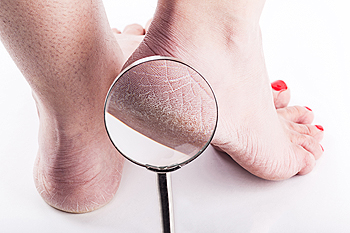 A common reason for the condition that is known as cracked heels to develop is having excessively dry skin. This can happen as a result of residing in cold environments, wearing shoes that have an open back, or from standing for the majority of the day. Additionally, existing medical conditions may contribute to the formation of cracked heels. These can include psoriasis and eczema, which are known to cause patches of dry skin. Patients have found mild relief when their feet are washed and dried daily, followed by thoroughly applying a good moisturizer. It may help to file the cracked skin away, in addition to wearing socks that are made of natural materials. If you have cracked heels, it is suggested that you speak with a podiatrist for effective treatment methods.
A common reason for the condition that is known as cracked heels to develop is having excessively dry skin. This can happen as a result of residing in cold environments, wearing shoes that have an open back, or from standing for the majority of the day. Additionally, existing medical conditions may contribute to the formation of cracked heels. These can include psoriasis and eczema, which are known to cause patches of dry skin. Patients have found mild relief when their feet are washed and dried daily, followed by thoroughly applying a good moisturizer. It may help to file the cracked skin away, in addition to wearing socks that are made of natural materials. If you have cracked heels, it is suggested that you speak with a podiatrist for effective treatment methods.
If the skin on your feet starts to crack, you may want to see a podiatrist to find treatment. If you have any concerns, contact one of our podiatrists from Lovely Foot Associates, PC. Our doctors can provide the care you need to keep you pain-free and on your feet.
Cracked Heels
It is important to moisturize your cracked heels in order to prevent pain, bleeding, and infection. The reason cracked heels form is because the skin on the foot is too dry to support the immense pressure placed on them. When the foot expands, the dry skin on the foot begins to split.
Ways to Help Heal Them
Ways to Prevent Cracked Heels
If you are unsure how to proceed in treating cracked heels, seek guidance from a podiatrist. Your doctor will help you with any questions or information you may need.
If you have any questions, please feel free to contact our office located in Johnstown, PA . We offer the newest diagnostic and treatment technologies for all your foot care needs.